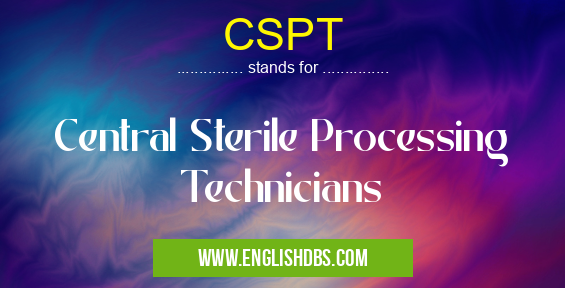What does CSPT mean in UNCLASSIFIED
CSPT stands for Central Sterile Processing Technicians. They are responsible for cleaning, disinfecting, and sterilizing medical instruments and equipment used in surgical procedures and other medical treatments. CSPTs play a vital role in preventing the spread of infection in healthcare settings.

CSPT meaning in Unclassified in Miscellaneous
CSPT mostly used in an acronym Unclassified in Category Miscellaneous that means Central Sterile Processing Technicians
Shorthand: CSPT,
Full Form: Central Sterile Processing Technicians
For more information of "Central Sterile Processing Technicians", see the section below.
Responsibilities of a CSPT
- Cleaning and disinfecting medical instruments and equipment
- Sterilizing medical instruments and equipment using various methods such as steam, ethylene oxide gas, or hydrogen peroxide gas plasma
- Inspecting medical instruments and equipment for damage or defects
- Packaging and storing medical instruments and equipment
- Maintaining a clean and sterile work environment
- Adhering to safety protocols and regulations
Education and Training
To become a CSPT, individuals typically complete a one-year certificate program or a two-year associate's degree in central sterile processing. These programs provide training in the principles of infection control, sterilization techniques, and the proper handling of medical instruments and equipment.
Career Outlook
The demand for CSPTs is expected to grow as the healthcare industry continues to expand. According to the U.S. Bureau of Labor Statistics, employment of CSPTs is projected to increase by 13% from 2021 to 2031, which is faster than the average growth rate for all occupations.
Essential Questions and Answers on Central Sterile Processing Technicians in "MISCELLANEOUS»UNFILED"
What is a Central Sterile Processing Technician (CSPT)?
A CSPT is a healthcare professional responsible for processing, sterilizing, and distributing medical devices and supplies. They ensure that surgical instruments, equipment, and other items used in patient care are clean, safe, and sterile.
What are the educational requirements to become a CSPT?
Typically, a high school diploma or equivalent is required. Most CSPTs receive formal training through an accredited certificate program or an associate's degree in Central Sterile Processing.
What are the primary responsibilities of a CSPT?
CSPTs are involved in the following tasks:
- Decontaminating and cleaning medical devices and instruments
- Preparing and sterilizing surgical trays and instruments
- Inspecting and maintaining sterile supplies
- Adhering to infection control and sterilization protocols
- Managing inventory and ensuring the availability of sterile supplies
What are the essential skills for a CSPT?
CSPTs should possess:
- Strong attention to detail and accuracy
- Knowledge of sterilization techniques and infection control
- Ability to work independently and as part of a team
- Physical stamina and dexterity
What is the job outlook for CSPTs?
According to the U.S. Bureau of Labor Statistics, the job outlook for CSPTs is expected to grow faster than average over the next decade due to increasing healthcare demands and the need for sterile medical supplies.
Final Words: CSPTs are essential members of the healthcare team who play a critical role in preventing the spread of infection. They are responsible for ensuring that medical instruments and equipment are clean, disinfected, and sterile, which is essential for the safety of patients and healthcare providers.
CSPT also stands for: |
|
| All stands for CSPT |
